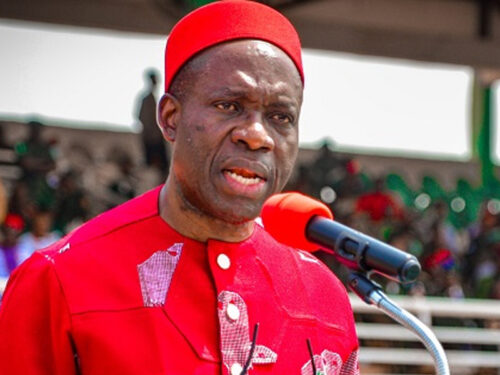The Economic and Financial Crimes Commission has launched an investigation into the alleged N1.3tn fraud perpetrated through CryptoBank Exchange, a digital investment platform.
CBEX, operated by a group of foreign nationals in collaboration with their Nigerian partners, reportedly collapsed on Monday, leaving thousands of investors stranded and unable to access their funds.
The EFCC spokesman, Dele Oyewale, confirmed to newsmen on Tuesday that the commission would collaborate with the International Criminal Police Organisation to investigate the incident.
Oyewale stated that the agency had already begun investigating CBEX before its collapse.
He added that efforts were underway to arrest both the local and international operators behind the fraudulent scheme.
He said, “We had our intelligence before the incident. We were already working on it, but now that the scheme has collapsed, the major actors and their collaborators will be brought in.
“We will ensure that we save Nigerians from all these troubles associated with Ponzi schemes. Don’t forget that we already issued an advisory — the 58 companies we alerted the public about. There are many more we are currently investigating.”
He also revealed that the commission was working to uncover other Ponzi schemes operating across the country.
“We are actively working to handle the CBEX situation. We will collaborate with other regulatory agencies to ensure that Nigerians are protected from this kind of scheme. We will do our job—where recovery is possible, we will recover; where prosecution is possible, we will prosecute.
“Overall, we will do our best. Additionally, there are similar frauds across the country that people are unaware of, and we are working to uncover them. We are on the local collaborators while we are partnering INTERPOL to trace the foreign operators,” he added.
We could not immediately verify the quantum of the fraud, but unconfirmed reports claimed Nigerian and foreign investors on the platform lost about N1.3trn in USDT.
Reports put the volume of stolen investors’ funds at $847m, which may likely increase.
The investment platform claims to offer 100 per cent returns within 30 days via online trading, but it restricted withdrawals on April 9, 2025.
Users were shocked to find that their accounts balance had been wiped out. The platform curiously asked them to deposit at least $100 to access their funds.
Several new users were said to have signed up in the days after the restricted withdrawals, in the belief that it was only a temporary security glitch and would be resolved in a matter of days.
Shortly before locking out its subscribers, the platform sent a message to them stating, “All accounts need to undergo the following verification steps to ensure their authenticity. For accounts with funds below $1,000 before any losses, a deposit of $100 is required. For accounts with funds exceeding $1,000, a deposit of $200 is required. Additionally, please keep your deposit receipts to ensure you can prove the authenticity of the account during future withdrawal reviews.”
CBEX had reportedly changed its domain name several times between January 2024 and February 1, 2025.
The platform, widely promoted on social media and among peer networks, promised high returns on investment, which induced Nigerians to invest substantial amounts.
The development came a few days after the Securities and Exchange Commission warned Nigerians to stay clear of unregistered trading platforms.
The SEC particularly pointed out that, in accordance with the Investment and Securities Act, 2025, recently signed by President Bola Tinubu, it is now an offence for any entity to operate an online forex trading platform or provide related services without prior registration with the commission.
The Director-General of the commission, Dr. Emomotimi Agama, described the new law as “a landmark step in positioning Nigeria’s capital market to be more inclusive, robust, and in tune with global best practices.”
Agama stated, “The ISA 2025 has given the Commission the legal backing to provide clarity, ensure investor protection, and enhance market confidence, especially in new and previously unregulated segments such as digital asset exchanges and online foreign exchange platforms.
“By virtue of this act, it is an offence in Nigeria for any entity that is not registered by the commission to carry out the business of online foreign exchange trading platforms or related services.
“Any business entity planning to set up a business in any of these areas is advised to visit the HOD DRM Department of the commission for further direction on how to register with the commission to avoid sanctions.”
Meanwhile, the crash of the platform has triggered nationwide outrage.
In Ibadan, Oyo State, aggrieved investors stormed the CBEX office in the Oke Ado area, forcing their way into the building and carting away furniture and office equipment in a show of frustration.
Members of the Nigeria Police Force and Western Nigeria Security Network, codenamed Operation Amotekun, were subsequently drafted to maintain peace at the CBEX office.
One of our correspondents, who visited the area on Tuesday, observed that patrol vehicles belonging to both the police and Amotekun were strategically stationed in the area.
An eyewitness said, “The crash of the online platform was announced yesterday (Monday). That’s what prompted many of those who invested in the scheme to storm the office to express their displeasure.
“As you can see, some security agents have been stationed at the office to prevent breakdown of law and order.”
The state Police Public Relations Officer, Adewale Osifeso, could not be reached for comments as of the time of filing this report.
In Abuja, the CBEX office located in the Jahi district was under lock and key when newsmen visited on Tuesday.
A private security guard stationed at the gate said access was now strictly limited to prevent possible attacks.
He also said no staff of the company came to work on Tuesday for fear of being attacked by frustrated investors.
“The instruction we received this morning was to lock the gate and carry out a due check to ensure the facility is not invaded. They are not the only ones here, and it may affect other businesses.
“That is why we did not allow you in. People have been coming, but we have refused to allow them to enter. Apart from this, none of their staff came to work today. I think they might have been informed not to show up, “the security guard said.
An investor lamented that she lost $10,000 to the scheme, adding that she was convinced that the business was legitimate when she saw her friend’s huge profit.
The victim, who spoke on condition of anonymity, stated, “I invested over $10,000 in the scheme. It has been a tough time for me. I was introduced by a friend and was convinced after I was shown evidence of the amount she made.”
She urged the security agencies to intervene and help them recover their funds.
“If the security agencies can help us recover our money back, we would be grateful.”
A businessman said he introduced three friends who invested about $8,000, while bemoaning the situation.
He said, “I am lucky to have escaped being defrauded. I invested $100 and I have made more than I invested, so I didn’t lose anything, though my $100 capital is trapped.
“But I feel bad that the people I introduced to the scheme might have lost their $8,000 investment. I don’t know how to broach the issue with them.”
In a post on Instagram, #the_real_aduke posted that she lost the $1,000 she was saving for her wedding.
She said, “I lost $1,000. That was my bridal savings. I don’t even know how to tell my fiancé. I feel numb.”
Chinenye Nduka disclosed her brother’s loss in a Facebook post, saying, “My brother invested his school fees and now he can’t even face my parents. God, this country keeps dealing with us.”
The Minister of the Federal Capital Territory’s spokesman, Lere Olayinka, called on the EFCC and the police to intensify efforts to unravel the fraudulent scheme.
However, he criticised the victims for their greed.
In a post on X (formerly Twitter), Olayinka wrote, “As for victims of CBEX, police and EFCC should be on the lookout. I don’t have sympathy for greed and foolishness.”
In March, the EFCC released a list of 58 companies involved in illegal investment schemes across Nigeria.
The EFCC spokesman, in a statement, revealed that some of the companies have already faced prosecution with five convicted for fraudulent activities.
He said another five companies pleaded guilty and are awaiting further legal procedures, but other companies on the list are yet to be arraigned in court.
Among the indicted companies are Wales Kingdom Capital and Bethseida Group of companies.
Others include AQM Capital Limited, Titan Multibusiness Investment Limited, and Farmforte Limited & Agro Partnership Tech, Richfield Multiconcepts Limited, Forte Asset Management Limited, and Biss Networks Nigeria Limited and others.
The commission said the companies lured investors with promises of quick and unrealistic profits in agriculture, real estate, and forex trading.
“They operated without proper licenses, deceiving the public with false investment opportunities. Many investors suffered heavy financial losses after these companies disappeared with their money. The EFCC has intensified efforts to recover stolen funds from these fraudulent companies,’’ the anti-graft commission stated.
Oyewale warned Nigerians to exercise caution before committing funds to any financial entity not duly registered with regulatory bodies.
“We urge the public to verify any investment opportunity with the CBN and SEC before engaging. The EFCC remains committed to safeguarding the public from predatory operators and ensuring a corruption-free economic environment,” the statement added.
He urged victims of fraudulent schemes to come forward with complaints and assured them that efforts were ongoing to recover funds where possible.
Meanwhile, as news of the collapsed CBEX scheme continues to ripple through Nigeria’s financial space, the staggering losses have left many questioning how such a massive fraud flew under the radar.
But for experts, the answer lies in a painful mix of unchecked greed and willful ignorance.
A banker and financial educator, Kelechi Godfrey, told The PUNCH how he was wooed to join the scheme.
He said, “Someone approached me to join CBEX, saying, ‘you are into finance, you can talk about this, generate leads and get people on it.’ When I asked, I said that they traded crypto using AI and they get plenty of returns. And in 30 days, you can get like 100 per cent of what you invested. I told the person that while AI is good when you start allowing AI to trade for you, some things happen in the market that AI cannot understand. But the person insisted that it was legitimate.
“Here’s one thing about us Nigerians, we are greedy, we want to eat our cake and have it back. You want to invest N100 and get N200 in the next hour and that has eaten deep into the finances of so many people and the funny part is due diligence is not being done. Google is your friend, and ChatGPT is there, how many minutes would it take to search for information on something that they want to invest in?
“We are talking about $800m worth of investment going down the drain. This amount of money put into the economy can impact positively on the economy and it’s lost to a Ponzi scheme that ran for how many days. Always do your due diligence, when you see returns that are not normal, that is too good to be true, just know that there is something fishy going on there. I also heard that they were forcing them to register people. A system that works well will not need you to bring in people. There is a lot we need to do.”
A financial analyst and investment banker, Segun Aremu, echoed similar sentiments saying that basic human greed was forcing Nigerians to go into these Ponzi schemes.
“From experience, I have discovered that our investors are oriented in such a way that they want big returns but not big risks. When it comes to this type of scheme, the number one reason is greed. Everyone who has become a victim of the Ponzi scheme is greedy. You may say that the economy is tough and people are trying to beat inflation but the truth is, there are verifiable investment products in the market for people. We keep saying these things but people turn a deaf ear. People are bullish without fundamentals.
“Secondly, the higher the returns, the higher the risks involved. Anywhere they are telling you about 100 per cent returns, just know that your money can also go missing. Many Nigerians don’t understand their risk appetite vis-à-vis their investment objective. That means when you are saving for school fees, you don’t use such funds for risky investments. Also, a lot of Nigerians don’t see financial advice, and we are many in the market.”


 BIG STORY5 days ago
BIG STORY5 days ago
 BIG STORY3 hours ago
BIG STORY3 hours ago
 BIG STORY5 days ago
BIG STORY5 days ago
 BIG STORY3 days ago
BIG STORY3 days ago
 BIG STORY5 days ago
BIG STORY5 days ago
 BIG STORY10 hours ago
BIG STORY10 hours ago
 BIG STORY3 days ago
BIG STORY3 days ago
 BIG STORY8 hours ago
BIG STORY8 hours ago


















